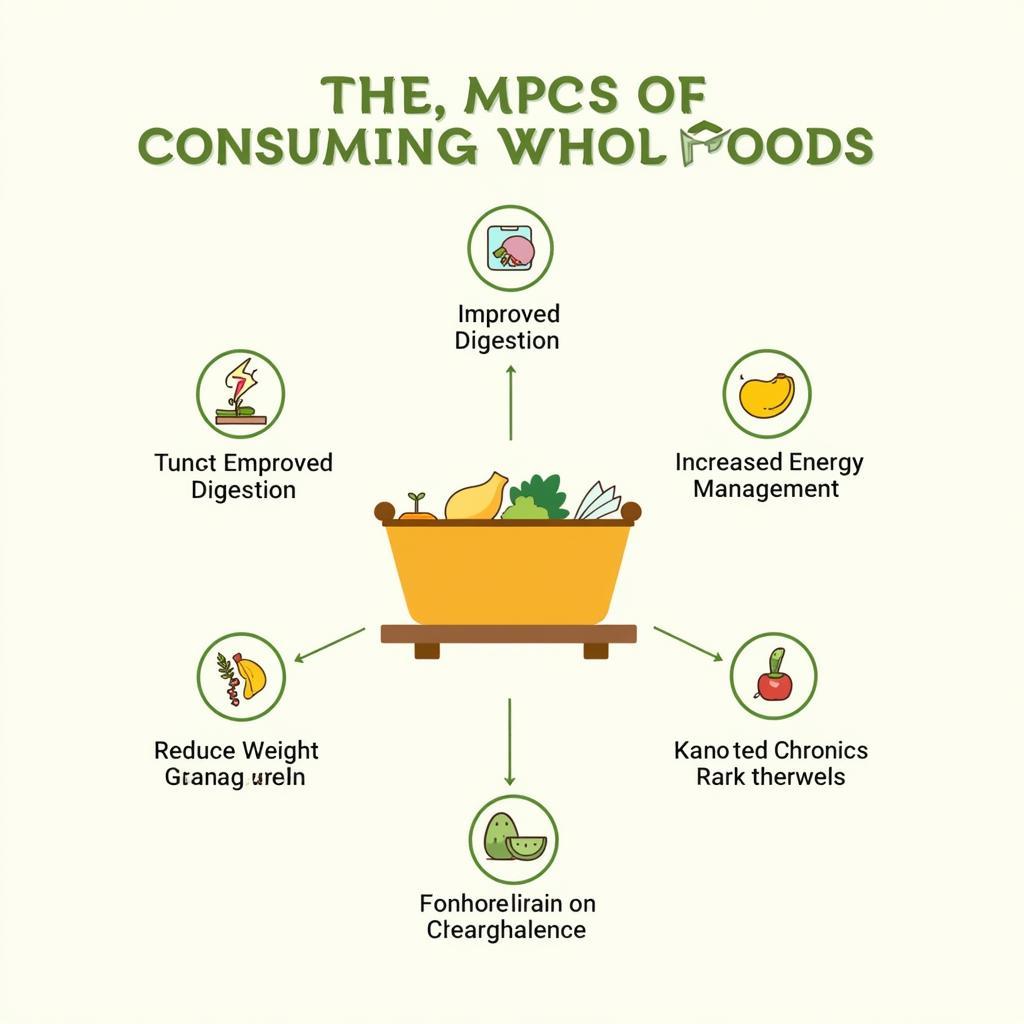Whole food. It’s a term that gets thrown around a lot these days, often gracing the covers of health magazines and dominating wellness blogs. But what does it actually mean, and why should you care?
In a world of processed convenience, understanding the importance of whole food is more crucial than ever. It’s not about hopping on the latest diet trend, but rather about embracing a sustainable way of eating that nourishes your body from the inside out.
What Exactly is Whole Food?
Simply put, whole food refers to foods that are as close to their natural state as possible. Think fruits bursting with vibrant colors, vegetables plucked straight from the garden, and grains that retain their wholesome goodness. These foods are minimally processed, free from artificial additives, and brimming with essential nutrients.
Here’s a closer look at what constitutes whole food:
- Fruits and Vegetables: Nature’s candy, packed with vitamins, minerals, antioxidants, and fiber.
- Whole Grains: Unlike refined grains, whole grains (like brown rice, quinoa, and oats) retain their bran and germ, providing a hearty dose of fiber, B vitamins, and minerals.
- Legumes: Beans, lentils, and chickpeas are nutritional powerhouses, offering protein, fiber, iron, and other vital nutrients.
- Nuts and Seeds: From almonds to chia seeds, these little wonders are packed with healthy fats, protein, fiber, and antioxidants.
- Lean Protein: Fish, poultry, eggs, and plant-based options like tofu and tempeh provide the building blocks for strong muscles and a healthy body.
Why Should You Choose Whole Food?
Choosing whole food isn’t just about following the latest health trend; it’s about making a conscious decision to nourish your body with the best nature has to offer. Here’s why incorporating more whole foods into your diet is a game-changer:
1. Nutrient Powerhouse:
Whole foods are naturally abundant in essential vitamins, minerals, antioxidants, and phytonutrients that are often lost during processing. These nutrients work synergistically to support overall health, boost immunity, and protect against chronic diseases.
2. Fiber Rich:
Fiber is an often-overlooked hero in the nutrition world. Whole foods, being excellent sources of fiber, promote healthy digestion, regulate blood sugar levels, and contribute to feeling fuller for longer, aiding in weight management.
3. Energy Boost:
Ditch the afternoon slump! Whole foods provide sustained energy release, keeping you fueled throughout the day without the sugar crashes associated with processed foods.
 Benefits of Eating Whole Food
Benefits of Eating Whole Food
4. Disease Prevention:
Studies have linked diets rich in whole foods to a lower risk of chronic diseases such as heart disease, type 2 diabetes, certain types of cancer, and obesity. The abundance of antioxidants in whole foods helps combat oxidative stress, protecting your cells from damage.
“Choosing whole foods is like investing in your health. It’s about nourishing your body with real, nutrient-dense ingredients that fuel your well-being and support a vibrant life.” – Dr. Sarah Thompson, Registered Dietitian.
How to Transition to a Whole Food Diet:
Transitioning to a whole food diet doesn’t require a complete overhaul overnight. Start by making small, gradual changes:
- Crowd Out Processed Foods: Gradually reduce your intake of processed foods, sugary drinks, and unhealthy fats.
- Cook More at Home: Cooking at home gives you control over ingredients and portion sizes.
- Read Food Labels: Pay attention to ingredient lists. Aim for products with fewer ingredients and recognizable names.
- Make Smart Swaps: Swap white bread for whole-wheat bread, sugary cereals for oatmeal with fruit, and sugary drinks for water or herbal teas.
Conclusion
Embracing a whole food diet is one of the most powerful gifts you can give your body. By choosing foods in their most natural state, you nourish yourself from within, boost your energy levels, and support long-term health. Remember, it’s not about perfection but about making sustainable changes that contribute to a healthier, happier you.
FAQ
-
Is it expensive to eat whole foods? Not necessarily! Choosing seasonal fruits and vegetables, buying in bulk, and cooking at home can make it affordable.
-
Can I still enjoy treats on a whole food diet? Absolutely! It’s all about balance. Enjoy treats in moderation while focusing on whole foods for the majority of your meals.
-
Do I need to buy organic? While organic is great, it’s not always accessible. Focus on buying whole foods and prioritize organic options for foods on the “Dirty Dozen” list.
-
What if I have dietary restrictions? You can adapt a whole food approach to fit your individual needs. Work with a registered dietitian to create a balanced meal plan.
-
Will I need to give up my favorite foods completely? Not at all! It’s about finding healthier alternatives and enjoying your favorite foods in moderation.
For any assistance, please contact us at Phone Number: 02437655121, Email: minacones@gmail.com Or visit us at: 3PGH+8R9, ĐT70A, thôn Trung, Bắc Từ Liêm, Hà Nội, Việt Nam. We have a 24/7 customer support team.